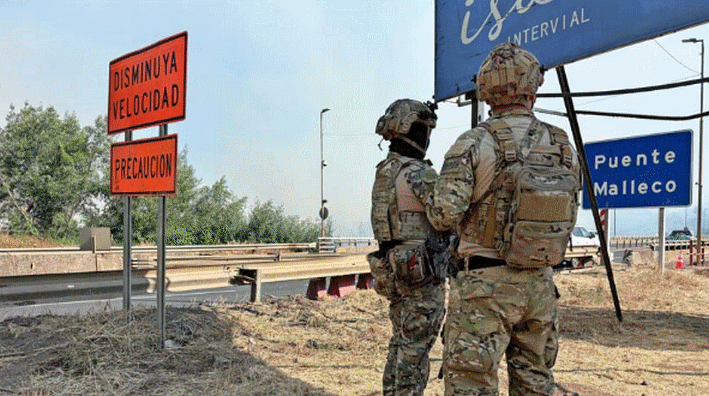Security experts warn of a potential escalation of violent incidents during the second half of the year in the southern macrozone, amid the new monthly extension of the state of emergency and the ongoing debate sparked by former Navy Commander-in-Chief Juan Andrés de la Maza regarding the continuity of the measure, which has been in place uninterrupted for three years in four provinces of Biobío and La Araucanía.
According to specialists, these actions could be driven by the start of trials against the Antihuen Santi brothers, accused of the homicide of three police officers in Cañete and facing potential life imprisonment, as well as against Pelentaro Llaitul, son of the leader of the Arauco Malleco Coordinator (CAM), who is charged with multiple arson attacks. Other factors include the anniversaries of the deaths of CAM activist Pablo Marchant and Temucuicui community member Camilo Catrillanca; the indigenous consultation process to modify the land distribution system; hunger strikes demanding prison benefits; and the ongoing presidential and legislative election campaigns, along with candidates' plans for the region.
"There is a combination of factors that objectively increase the risk levels of violent incidents in the southern macrozone in the coming months," explains Felipe Harboe, former Undersecretary of the Interior and researcher at the Center for Studies in Security and Organized Crime (Cescro) at San Sebastián University.
Call for Targeted Security Measures
He adds, "For this reason, it is essential that intelligence authorities raise these alerts to adopt special security measures during periods when available information could anticipate some type of risk."
The former undersecretary emphasized that "measures must be targeted and intelligent," while lamenting the delays in processing the bill to amend the Intelligence Law. "This directly impacts the situation because, beyond operational police agents, civilian personnel are also needed to gather information that other officials cannot access," Harboe stated, arguing that "Chile needs this regulation, leaving behind past prejudices, to provide democracy with timely information to prevent further acts of terrorism."
"The Past Teaches Us Not to Take a Short-Term View"
Francisco Ljubetic, former regional prosecutor of La Araucanía and Vice Dean of Law at the Autonomous University, agreed that during the second half of the year, "it is very likely that greater conflict will arise, as there is a planned series of events driving this scenario, in addition to unforeseen contingencies that must be addressed, such as those seen in recent weeks," referring to the attacks and threats against the Gendarmerie.
For this reason, he stressed that "security measures must be permanently in place and developed with necessary adjustments, because the past teaches us not to take a short-term view." He emphasized that "national authorities and the citizens of the southern macrozone themselves have..."
Ljubetic recommended that "it is always necessary to adjust certain security conditions for specific dates and milestones and not lower our guard in coordinated protection and defense systems for the area." He stressed, "We have already seen that whenever measures are relaxed, opportunities arise for violent actors to operate—and they do so with greater force."
Source:El Mercurio







Comments (0)
No comments yet. Be the first to comment!
Leave a comment